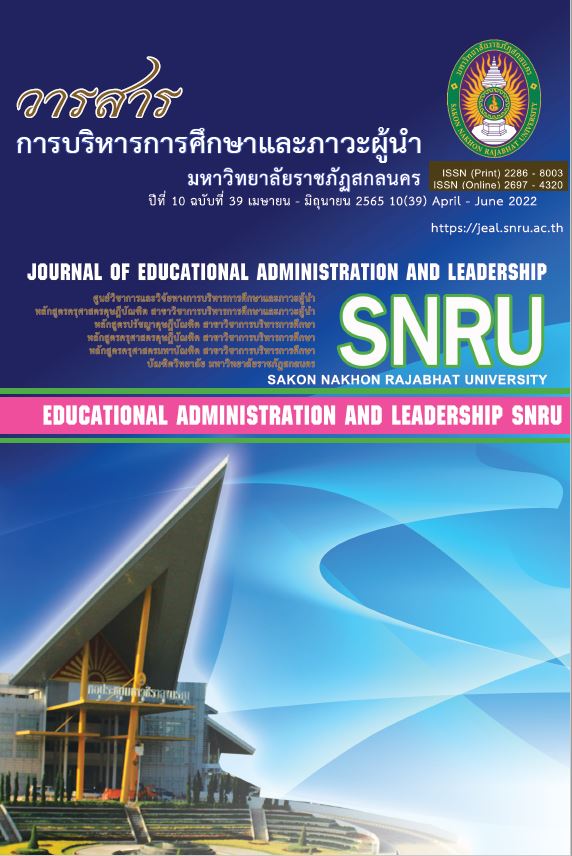

ความสัมพันธ์ระหว่างรูปแบบภาวะผู้นำของผู้บริหารสถานศึกษากับประสิทธิผลการปฏิบัติงาน ของครูในสถานศึกษา สังกัดอาชีวศึกษาจังหวัดสกลนคร
The Relationship Between School Administrator’ Leadership Styles and The Effectiveness of Teachers’ Work Performance In Educational Institutions Under Vocational Education Sakon Nakhon
ผู้แต่ง
ประชา เสริมสกุล, สุมัทนา หาญสุริย์, ไชยา ภาวะบุตร
Author
Pracha Sermsakul, Sumattana Hansuri, Chaiya Pawabutra
บทคัดย่อ
การวิจัยครั้งนี้มีวัตถุประสงค์เพื่อศึกษา เปรียบเทียบ หาความสัมพันธ์ และหาแนวทางการพัฒนารูปแบบภาวะผู้นำของผู้บริหารกับประสิทธิผลการปฏิบัติงานของครูในสถานศึกษา สังกัดอาชีวศึกษาจังหวัดสกลนคร ตัวอย่างที่ใช้ในการวิจัยผู้บริหารและครูในสถานศึกษา สังกัดอาชีวศึกษาจังหวัดสกลนคร ปีการศึกษา 2563 จำนวน 280 คน จำแนกเป็นผู้บริหาร 93 คน และครู 187 คน ซึ่งได้จากการเทียบตารางของ (Kerjcic and Morgan) โดยใช้การสุ่มตัวอย่างแบบแบ่งชั้น (Stratified Random Sampling) โดยใช้สถานศึกษาเป็นชั้น (Strata) เครื่องมือที่ใช้ในการเก็บรวบรวมเป็นแบบสอบประเมิน ชนิดมาตรส่วนประมาณค่า 5 ระดับมีค่าอำนาจจำแนกอยู่ระหว่าง 0.28-0.82 และค่าความเชื่อมั่น 0.97 สถิติที่ใช้ในการวิเคราะห์ข้อมูล ได้แก่ ความถี่ ร้อยละ ค่าเฉลี่ย และส่วนเบี่ยงเบนมาตรฐาน ทดสอบสมมติฐานโดยใช้ การทดสอบที (t-test) ชนิด Independent Samples การวิเคราะห์ความแปรปรวนทางเดียว (One-Way ANOVA) และค่าสัมประสิทธิ์สหสัมพันธ์อย่างง่ายของเพียร์สัน (Pearson Product-Moment Correlation Coefficient)
ผลการวิจัยพบว่า
1. ภาวะผู้นำแต่ละรูปแบบของผู้บริหาร ตามความคิดเห็นของผู้บริหารและครู โดยรวมอยู่ในระดับมาก
2. ประสิทธิผลการปฏิบัติงานของครู ตามความคิดเห็นของผู้บริหารและครู โดยรวมอยู่ในระดับมาก
3. ภาวะผู้นำแต่ละรูปแบบของผู้บริหาร ตามความคิดเห็นของผู้บริหารและครู จำแนกตามประเภทของสถานศึกษา สถานภาพการดำรงตำแหน่ง และขนาดของสถานศึกษา ไม่แตกต่างกันทั้งโดยรวม และรายด้าน จำแนกตามประสบการณ์ในการปฏิบัติงานที่ต่างกัน โดยรวมไม่แตกต่างกัน เมื่อพิจารณารายด้านพบว่า แตกต่างกันอย่างมีนัยสำคัญทางสถิติที่ระดับ .01
4. ประสิทธิผลการปฏิบัติงานของครู ตามความคิดเห็นของผู้บริหารและครู จำแนกตามประเภทของสถานศึกษา โดยรวมแตกต่างกันอย่างมีนัยสำคัญทางสถิติที่ระดับ .01 จำแนกตามสถานภาพการดำรงตำแหน่งไม่แตกต่างกันทั้งโดยรวม และรายด้าน จำแนกตามขนาดของสถานศึกษาและประสบการณ์ในการปฏิบัติงานโดยรวมไม่แตกต่าง
5. รูปแบบภาวะผู้นำของผู้บริหาร (X) กับประสิทธิผลการปฏิบัติงานของครู (Y) พบว่า มีความสัมพันธ์ทางบวก อย่างมีนัยสำคัญทางสถิติที่ระดับ .01 โดยมีค่าสัมประสิทธิ์สหสัมพันธ์ .816
6. แนวทางการพัฒนาภาวะผู้นำแต่ละรูปแบบของผู้บริหารกับประสิทธิผลการปฏิบัติงานของครู จำนวน 8 ด้าน ที่ต้องได้รับการพัฒนา ดังนี้ ด้านภาวะผู้นำแบบมุ่งผลสัมฤทธิ์ ผู้บริหารกำหนดเป้าหมาย สร้างความมั่นใจในการทำงานแก่บุคลากร เปิดโอกาสในการทำงานอย่างเต็มที่ ด้านภาวะผู้นำแบบสั่งการ ผู้บริหารกำหนดเป้าหมาย หลักเกณฑ์ให้กับบุคลากรอย่างชัดเจน ด้านภาวะผู้นำแบบสนับสนุน สร้างขวัญกำลังใจสร้างบรรยากาศในการทำงานให้ผู้ใต้บังคับบัญชาลดอาการวิตกกังวลในการปฏิบัติ ด้านภาวะผู้นำแบบเปลี่ยนแปลง สนับสนุนส่งเสริมให้ผู้บริหารได้ใช้แบบภาวะผู้นำการเปลี่ยนแปลงไปใช้ในการบริหารจัดการ ด้านคุณภาพผู้เรียน ศึกษาดูงานโรงเรียนที่ปฏิบัติเป็นเลิศในด้านการพัฒนาผู้เรียน ด้านการทำงานเป็นทีม ร่วมกันทำงานเป็นทีมกำหนดบทบาท หน้าที่ชัดเจน ด้านการจัดการชั้นเรียนจัดอบรมและประชุมเพื่อสร้างความรู้ทักษะและแนวทางการจัดชั้นเรียน และด้านการใช้สื่อ นวัตกรรม และเทคโนโลยีสารสนเทศทางการศึกษา จัดอบรมเชิงปฏิบัติการให้ครูได้มีความรู้แล้วทักษะการใช้สื่อและนวัตกรรมและเทคโนโลยีสารสนเทศ
Abstract
The purposes of this research were to examine, compare, determine the relationships, and establish the guidelines Establish the guidelines for upgrading between school administrator’ leadership styles and the effectiveness of teachers’ work performance. The sample, obtained through stratified random sampling, comprised 95 school administrators, and 187 teachers, yielding a total of 280 participants working in educational institutions under vocational education Sakon Nakhon in the academic year 2020. The research instrument for data collection was a rating scale questionnaire with the discrimination between 0.28-0.82 and the reliability of 0.97. The statistics for data analysis were percentage, mean and standard deviation. The hypothesis testing was done through t-test for Independent Samples, One-Way ANOVA, and Pearson’s product-moment correlation.
The findings were as follows:
1. School administrator’ leadership styles as a whole was at a high level.
2. The effectiveness of teachers’ work performance as a whole was at a high level
3. School administrator’ leadership styles as perceived by school administrators and teachers, classified by type of school, status, and school sizes as a whole and each aspect was not different, work experiences as a whole was not different each aspect differed at a statistical significance of .01 level.
4. The effectiveness of teachers’ work performance as perceived by school administrators and teachers, classified by type of school as a whole differed at a statistical significance of .01 level, status as a whole and each aspect was not different, school sizes and work experiences as a whole was not different.
5. School administrator’ leadership styles and the effectiveness of teachers’ work performance had a positive relationship at the .01 statistical significance level with the correlation coefficient of .816.
6. The guidelines for upgrading between school administrator’ leadership styles and the effectiveness of teachers’ work performance consisted of 8 aspects, including Achievement leadership administrator set goals Build confidence in working for personnel Fully open to career opportunities, Directive leadership administrator set goals Criteria for personnel clearly, Supportive leadership Build morale, create a working environment for subordinates, reduce anxiety symptoms in practice, Transformation leadership Support and encourage executives to use the transformational leadership model to be used in management, Learner quality Study tour for schools that practice excellence in learner development, Team Work together as a team, define roles. Clear duty, Classroom management Organize training and meetings to build knowledge, skills and approach to class arrangement and The use of innovative media and information technology in education Organize workshops for teachers to acquire knowledge, media skills, and innovation and information technology
คำสำคัญ
รูปแบบภาวะผู้นำของผู้บริหาร, ประสิทธิผลการปฏิบัติงานของครูKeyword
School Administrator’ Leadership styles, The Effectiveness of Teachers’ Work PerformanceNotice: Undefined variable: dataSet in /var/www/html/ArticleView.php on line 116
Notice: Trying to access array offset on value of type null in /var/www/html/ArticleView.php on line 116
บทความทุกบทความเป็นลิขสิทธิ์ของ
Notice: Undefined variable: dataSet in /var/www/html/ArticleView.php on line 116
Notice: Trying to access array offset on value of type null in /var/www/html/ArticleView.php on line 116
เท่านั้น
กำลังออนไลน์: 9
วันนี้: 1,031
เมื่อวานนี้: 2,755
จำนวนครั้งการเข้าชม: 1,278,537
อาคารบัณฑิตวิทยาลัย ชั้น 2 ตำบลธาตุเชิงชุม อำเภอเมือง จังหวัดสกลนคร 47000
โทร/
แฟกซ์ 0-4297-0093
บรรณาธิการ: รองศาสตราจารย์ ดร.ไชยา ภาวะบุตร
ติดต่อ/สอบถาม: นายธีรเวทย์ เพียรธัญญกรณ์
โทร: 0-4297-0093